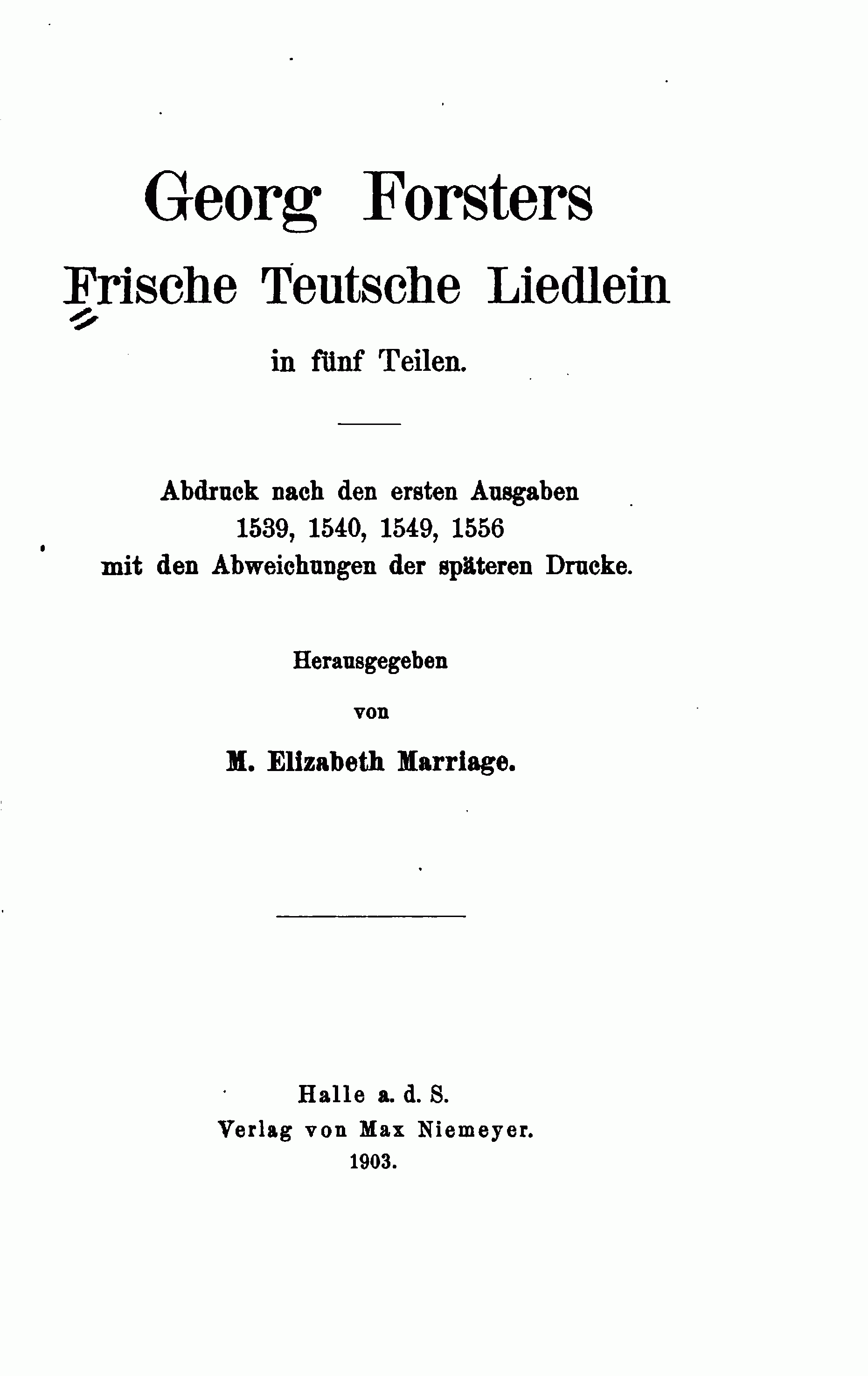Frische Teutsche Liedlein on:
[Wikipedia]
[Google]
[Amazon]
 Frische teutsche Liedlein is a five-part collection of songs, which was written and published in 1539-1556 by the doctor, composer and song collector
Frische teutsche Liedlein is a five-part collection of songs, which was written and published in 1539-1556 by the doctor, composer and song collector
(2nd edition 1543; 3rd edition 1549 itle modified 4th edition 1552 itle modified 5th edition 1560/61) * ''Der ander theyl kurtzweiliger guter frischer Teutscher Liedlein zu singen vast lustig''. Nürnberg 1540
(2nd edition 1549 itle modified 3rd edition 1553; 4th edition 1565) * ''Der dritte theyl schöner lieblicher alter und newer Teutscher Liedlein, nicht alleine zu singen sondern auch auff allerley Instrumenten zu brauchen … und vormals nie gesehen''. Nürnberg 1549
(2nd edition 1552 itle modified 3rd edition 1563) * ''Der vierdt theyl schöner frölicher frischer alter und newer Teutscher Liedlein mit vier stimmen nicht allein zu singen sondern auch auff allen Instrumenten zu brauchen''. Nürnberg 1556 * ''Der fünfft theyl schöner alter und newer Teutscher liedlein mit fünff stimmen nicht allein zu singen sondern auch auff allen Instrumenten zu brauchen''. Nürnberg 1556
Digitalisat der vier Stimmbücher des 1. Teils
(signature: München, Bayerische Staatsbibliothek – 4 Mus.pr. 167) * {{Portal bar, Music, Germany Song books 16th-century German literature
 Frische teutsche Liedlein is a five-part collection of songs, which was written and published in 1539-1556 by the doctor, composer and song collector
Frische teutsche Liedlein is a five-part collection of songs, which was written and published in 1539-1556 by the doctor, composer and song collector Georg Forster
Johann George Adam Forster, also known as Georg Forster (, 27 November 1754 – 10 January 1794), was a German naturalist, ethnologist, travel writer, journalist and revolutionary. At an early age, he accompanied his father, Johann Reinhold F ...
(around 1510 in Amberg – 12 November 1568 in Nuremberg). It comprises 380 polyphonic, predominantly secular German songs. The collection later received its collective name. It is the most extensive and important song publication of the time and one of the most important sources for tenor
A tenor is a type of classical music, classical male singing human voice, voice whose vocal range lies between the countertenor and baritone voice types. It is the highest male chest voice type. The tenor's vocal range extends up to C5. The lo ...
singers (with the cantus firmus
In music, a ''cantus firmus'' ("fixed melody") is a pre-existing melody forming the basis of a polyphonic composition.
The plural of this Latin term is , although the corrupt form ''canti firmi'' (resulting from the grammatically incorrect tr ...
in the tenor, such as a version of ''Innsbruck, ich muss dich lassen
"" ("Innsbruck, I must leave thee") is a German Renaissance song. It was first published as a choral movement by the Franco-Flemish composer Heinrich Isaac (ca. 1450–1517); the melody was probably written by him. The lyricist is unknown; an autho ...
'' by Heinrich Isaac
Heinrich Isaac (ca. 1450 – 26 March 1517) was a Netherlandish Renaissance composer of south Netherlandish origin. He wrote masses, motets, songs (in French, German and Italian), and instrumental music. A significant contemporary of Josquin de ...
and ''Mir ist ein rot Goldfingerlein'' by Ludwig Senfl
Ludwig Senfl (born around 1486, died between December 2, 1542 and August 10, 1543) was a Swiss composer of the Renaissance, active in Germany. He was the most famous pupil of Heinrich Isaac, was music director to the court of Maximilian I, Holy R ...
).
Volumes
* ''Ein außzug guter alter und newer Teutscher liedlein/einer rechten Teutschen art/auff allerley Instrumenten zubrauchen/außerlesen''. Nürnberg 1539(2nd edition 1543; 3rd edition 1549 itle modified 4th edition 1552 itle modified 5th edition 1560/61) * ''Der ander theyl kurtzweiliger guter frischer Teutscher Liedlein zu singen vast lustig''. Nürnberg 1540
(2nd edition 1549 itle modified 3rd edition 1553; 4th edition 1565) * ''Der dritte theyl schöner lieblicher alter und newer Teutscher Liedlein, nicht alleine zu singen sondern auch auff allerley Instrumenten zu brauchen … und vormals nie gesehen''. Nürnberg 1549
(2nd edition 1552 itle modified 3rd edition 1563) * ''Der vierdt theyl schöner frölicher frischer alter und newer Teutscher Liedlein mit vier stimmen nicht allein zu singen sondern auch auff allen Instrumenten zu brauchen''. Nürnberg 1556 * ''Der fünfft theyl schöner alter und newer Teutscher liedlein mit fünff stimmen nicht allein zu singen sondern auch auff allen Instrumenten zu brauchen''. Nürnberg 1556
Selection of well-known songs from the collection
* Drei Laub auf einer Linden () * Entlaubet ist der Walde (Thomas Stoltzer
Thomas Stoltzer, also Stolczer, Scholczer (c.1480–1526) was a German composer of the Renaissance.
Life
Nothing is known of Stoltzer's early life, though he is thought to have come from the same family as Clemens Stoltzer, who was a town clerk in ...
)
* Es liegt ein Schloß in Österreich (Caspar Othmayr)
* Es wollt ein Jäger jagen
* Im Mayen, im Mayen
* Innsbruck, ich muß dich lassen (Heinrich Isaac
Heinrich Isaac (ca. 1450 – 26 March 1517) was a Netherlandish Renaissance composer of south Netherlandish origin. He wrote masses, motets, songs (in French, German and Italian), and instrumental music. A significant contemporary of Josquin de ...
)
* Mir ist ein feins brauns Maidelein (Caspar Othmayr)
* Vergangen ist mir Glück und Heil
* Wie schön blüht uns der Maien (Caspar Othmayr)
* Wir zogen in das Feld
* Wo soll ich mich hinkehren
* Wohl auf, gut Gsell, von hinnen (Caspar Othmayr)
Editions
* Kurt Gudewill et al. (ed.): ''Georg Forster: Frische teutsche Liedlein (1539–1556)''. (' Volume 20; 60–63). Möseler, Wolfenbüttel 1964–1997. * M. Elizabeth Marriage (ed.): ''Georg Forsters Frische Teutsche Liedlein in fünf Teilen.'' Niemeyer, Halle 1903 ().Literature
*External links
Digitalisat der vier Stimmbücher des 1. Teils
(signature: München, Bayerische Staatsbibliothek – 4 Mus.pr. 167) * {{Portal bar, Music, Germany Song books 16th-century German literature